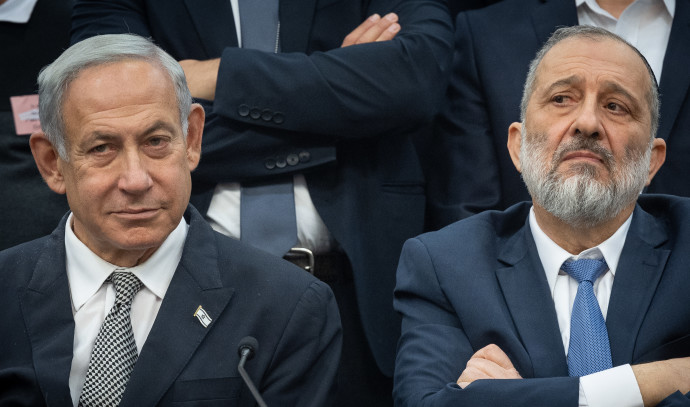National Security Minister MK Itamar Ben-Gvir refused an offer by Prime Minister Benjamin Netanyahu to become a permanent attendee of security consultations regarding the ongoing Israel-Hamas war, in exchange for Ben-Gvir’s support for a controversial bill widely viewed as aiming to benefit the ultra-Orthodox Shas party, according to a spokesperson for Ben-Gvir.
The national security minister demanded to be a full member of a new war cabinet and be part of the decision making and not just receive updates, the spokesperson said.
The Likud said in response, “The report is full of inaccuracies. Prime Minister Netanyahu told Ben-Gvir something simple: Whoever wants to be part of the small security consultation team must prove that he does not leak state secrets or private conversations.”
Ben-Gvir responded by accusing the prime minister of being the source of leaks from the previous war cabinet, which was disbanded after MK Benny Gantz’s National Unity party left the governing coalition on June 9.
National Unity said in its own response to the Likud, “Whoever thinks that there is a minister who leaks state secrets, should not give him control over the Israel Police, and a place in the [security] cabinet.”
The proposal to Ben-Gvir was made during a late-night attempt by Netanyahu to overcome opposition from his own coalition to the bill, knows as the “Rabbi’s Bill”. The bill would have increased Israel’s orthodox parties’ control of the country’s religious establishment by giving the Religious Services Ministry, run by Shas, the power to appoint hundreds of rabbis to posts of municipal and neighborhood rabbis. This power currently resides with the municipalities themselves, and not the ministry.
Criticism of the bill by both the opposition and coalition focused on two points: First, the fact that the bill was politically motivated and intended to grant lucrative jobs to political allies, and second, that it takes the power to appoint rabbis who are appropriate to the specific character of each city and neighborhoods away from mayors and local authority leaders, and gives it to the national government.
Arye Deri furious with Netanyahu over Rabbi Law abandonment
Shas chairman MK Arye Deri was reportedly furious with Netanyahu after the latter announced that the bill would be dropped, and the issue on Wednesday developed into crisis as parties within the coalition began lobbing accusations at each other.
In a statement on Wednesday, Shas argued that the purpose of the bill was simply to appoint rabbis to cities and neighborhoods that currently did not have them. The party claimed that a majority of Israel’s Jewish citizens live in municipalities that do not have rabbis, and that this negatively affected the state’s ability to provide religious services.
“It must be understood, just like there are no medical services without doctors, so too there are no religious services without rabbis. There is no Kashrut without rabbis, and there is no marriage without rabbis,” the party said, referring to the rabbinical system’s statutory authority over marital status, kashrut, burial, conversion, and other matters.
A number of mayors who took part in a Knesset Constitution Committee debate on the bill admitted that many cities do not have rabbis, but argued that this could be solved by a simple executive directive or even an informal request by the government to appoint these rabbis. According to the mayors, the fact that the bill tilted the balance of power in the body that elects the rabbis away from the cities and towards the Shas-controlled Religious Services Ministry, showed that it was not really about appointing rabbis, but about appointing rabbis from Shas. The mayors pointed out other problematic provisions in the law, such as that it did not limit the rabbis’ tenure, and that it lowered the percentage of women required in the electing body.
Shas claimed in the statement that Justice Minister Yariv Levin and coalition whip Ofir Katz had pledged the support of all the entire coalition for the bill. “Unfortunately, there are Members of Knesset in the coalition who do as they please, harm Israeli tradition, and destabilize the coalition’s foundations,” the party said.
Shas added that it had formed a team that included four of its ministers to “examine how to continue to promote this important bill with broad agreements with all sides.”
The announcement that the bill would be dropped from the Knesset’s agenda came at approximately 1:00 a.m. on Wednesday. The decision came after the prime minister held consultations with Katz, and was likely a result of both pressure from Likud mayors who opposed the bill, and the fact that a majority for the bill to proceed in the Knesset Constitution Committee was not guaranteed after two Likud MKs and an MK from Otzma Yehudit refused to support it.
According to Israel Hayom, Deri was furious with Netanyahu and accused the prime minister in a phone call late Tuesday night of being unable to apply discipline in his party. A number of senior coalition members were quoted in various reports as saying that this was a real political crisis that could destabilize the coalition.
A source from Shas said on Tuesday that Deri was determined to pass the bill both because of its importance to him, and as a statement to the coalition that the Likud must be committed to coalition discipline, or else the coalition will dissolve.
The late-night decision to drop the bill came after a series of political moves and accusations between the Likud, Shas, and Otzma Yehudit.
The coalition enjoys a 9-7 majority in the Knesset Constitution Committee, in which the bill was set to be put to a vote. However, two Likud MKs, Tally Gotliv and Moshe Sa’ada, announced earlier this week that they would vote against the bill, thus removing the coalition’s majority. Katz on Tuesday removed Gotliv and Sa’ada as members of the committee, in favor of two other Likud MKs expected to vote “yes.” However, the sole member of Otzma Yehudit in the committee, Mk Yizhak Kreuzer, also stated that he would vote “no,” meaning that the vote would have resulted in an 8-8 tie and failed.
Otzma Yehudit on Tuesday accused the Likud and Shas of attempting to cut a deal with the two representatives of the Arab parties in the committee, MK Ofer Cassif (Hadash Ta’al) and MK Mansour Abbas (Ra’am) to abstain from the vote and enable it to pass. Shas denied the claim and the two coalition parties traded barbs publicly on Tuesday evening.

Abhinav Thawait is a globe-trotting correspondent with a passion for international affairs. With a background in international relations, he offers a global perspective on the most pressing issues around the world. Abhinav’s curiosity takes his to the far corners of the earth, where he seeks to share untold stories and diverse viewpoints.




/cdn.vox-cdn.com/uploads/chorus_asset/file/25513802/vaio_monitor.jpg)



